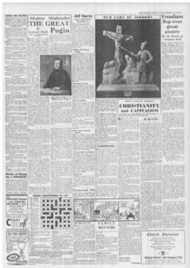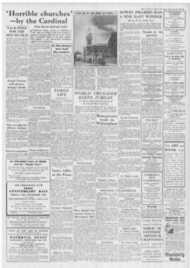Page 3, 12th September 1952
Page 3

Report an error
Noticed an error on this page?If you've noticed an error in this article please click here to report it.
Tags
Share
Related articles
Religion In Poetry
Of People
And Moreover...
Ireland
News In Brief
THE LATEST BOOKS
CHRISTIANITY
and CAPITALISM
RELIGION AND THE DECLINE OF CAPITALISM, by V. A. Demant, D.D. (Faber & Faber, London, 12s. 6d.).
By ALCUIN
SINCE 1930 Canon V. A. Dement has been in the forefront of the group of Anglican clergymen who have endeavoured to apply their Christianity to the social and economic problems of the times; not only in practice, which the least of us can do, but in analysis and theory. which is in some ways more important.
In 1931 he tackled the grave problem of the vast unemployment of the general depression which disturbed the consciences of so many Christians. He has produced a book on sonic aspects of 'Christianity in the Modern World" every two or three years since.
In 1949 Dr. Dement was invited to give the "Scott Holland Memorial Lectures" at Oxford. He took up the subject with which Professor I. R. H. Tawney had opened the series in 1922, and from which came the now well-known book Religion and the Rise of Capitalism. Canon Demant's lectures were consequently given under the general title, "Religion and the Decline of Capitalism."
They were received with such acclaim by their limited audience that the B.B.C. asked Canon Dement to give a shortened version of them in the Third Programme of the Home Service.
This series of lectures were given before an invited audience in Broadcasting House, and roused very wide interest and a large following. COmpletely revised and enlarged, they have recently appeared in book form : Religion and the Decline of Capitalism. There is, therefore, little call here to enlarge on Dr. Demant's subject or his already widely appreciated treatment of it.
Suffice it to say that this is a hook that few can afford to miss reading if they did not follow the B.B.C. lectures in their entirety-and, perhaps, even if they did. In this book Canon Demant's argument is developed more fully, and more leisurely; and the helpful notes and references are given at the end of each chapter. There is also a full index of authors and a separate index of subjects.
An interested reading of the book has, however, confirmed an impression gained from listening to the
broadcast version of the lectures that Dr. Dement does scant justice to the great papal encyclicals Rerun Novarum and Quadregesimo Anno. (One would have thought that it was scarcely possible to deal with the subject "Religion and the Decline of Capitalism" without a close analysis of the substance and the effect of these most important documents in the case. Yet in fact there is only a passing reference to them on page 43.
This omission is not only a sadly lost opportunity, but something of a real blemish on a work that can otherwise be so heartily recommended for serious study. More than many others. Dr. Dement was ,irt a position to engage a hearing for these papal pronouncements with Christians to whom they are equally addressed with Catholics but by whom they have been sadly neglected.
It is certainly true that their usefulness and pertinence to the problem is far from exhausted by the changes that have taken place in the economic climate since they were addressed to the Christian world.
AN INTRODUCTION TO THE STUDY OF BLAKE, by Max Plowman (Gollancz, 12s. 6d.). 1 F a poet, a painter and a prophet could be rolled into one and then persuaded to read and interpret the works of William Blake we should come as near as is humanly possible to a full appreciation of this remarkable man. But painters of worth and genius are rare enough and prophets rarer still, so it is left to the bumbler poet to essay the task for us. He comes nearer to complete success than any predecessor in this so rewarding task.
Twenty-five years ago the American poet Max Plowman published An Introduction to the Study of Blake, now through the Max Plowroan Fund, raised on his death in 1941 by his friends to commemorate him and his works, this fine exposition of Blake's philosophy and symbolism is printed in England for the first time (Victor Gollancz, 12s. 6c1.). Blake was an Evangelical Christian of deep religious convictions and unusual religious experience; a painter and poet of magical evocativeness with a helpfulness and pleasing but illusory simplicity of vocabulary and image; cf. his lamb, gold, silver, soul, earth, heaven.
Much more than most poets he needs an introduction and much more than most the reading of even his simplest poems is enhanced by a knowledge of his approach to the ultimate problems of life-his philosophy. This is what Max Plowman sets out to define; this and symbolism in which Blake wrote always of the one thing which in itself and in his own life was most important : the human soul, its relation to the body, and its own creator.
Both painting and poetry for Blake served the same transcendental aim, in both he sought neither pleasure, recreation nor elegance. but God. Both were means of divine communications.
blog comments powered by Disqus







